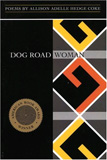June 5, 2009DOG ROAD WOMAN
Review by Moira Richards
Coffee House Press
79 Thirteenth Avenue NE
Suite 110
Minneapolis, MN 55413
IBSN 978-1-56689-061-8
1997, 96 pp., $16.00
www.coffeehousepress.org
Dog Road Woman is Allison Hedge Coke’s first full-length book of poems and with it she won the American Book Award in 1998. Previous winners of the award include Toni Morrison’s Beloved, Audre Lorde’s A Burst of Light and Paula Gunn Allen’s Spider Woman’s Granddaughters: Traditional Tales and Contemporary Writing by Native American Women. The best company indeed!
This collection comprises a variety of visually intriguing poems. Some are narrow, with just one or two words per line forming margins on the page; another spreads over nine pages divided into two columns–sometimes words in one of the columns, sometimes in both. A third poem is a punctuationless mass of words, separated only with small spaced gaps, occasional line breaks and which is the perfect vehicle for the breathless, stream-of-consciousness tale of horror that it narrates. These forms seem to me to evoke somehow an ages-old oral literary tradition–one that is filled with pauses and silences and interpolated with words from people perhaps not physically present.
Practically all the poems in Dog Road Woman carry dedications to people, and not to famous people so far as I know. They are simply poems “for Sandy” or “for Bill T.H” or “for Charmaine and all the res children,” which last are:
the lucky ones,
unaffected by
FAS … FAE(“Pleas,” 56)
Those acronyms, and others I encountered in this book–BIA and the more chilling CIB–had me mousing over to google for explanation. Fetal Alcohol Syndrome, Fetal Alcohol Effects, Bureau of Indian Affairs, Certificate of Indian Blood. No wonder that many of Allison Hedge Coke’s poems are angry. They bring me insight into a history that is both old and still in the making:
So, your ancestors
were fresh off the
boat, huhn, the
Mayflower, huhn,
mine were here to meet them…
Today due to
the monumental
change inflicted upon us
by the European transplant society mark us like targets
to be used, cruised, abused
conned, and taken advantage of
even by some of our own people(“Legacy,” 60, 64)
I live in a country where the vast majority of the population was oppressed, marginalized for decades. It seems to me such a system of imbalance cannot hold, must inevitably collapse and give way to some sort of balance. But what hope is there of voice for peoples in the world who find themselves not only marginalized but greatly outnumbered and economically prejudiced?
Poems like those in Dog Road Woman ripple the pond, poems such as “Shoe Gestapo at the Blue Light Special Place,” which narrates racist treatments of Native Americans in their own country. And there is much poetry that tells of cultural colonisation:
If they truly respected
Crazy Horse they would
simply name a mountain
for him and leave the
physical form pure
rather than blasting
it into a replica
supposedly of him,
he who had no picture ever
taken.(“Legacy,” 67)
Twenty consecutive pages of this book spin the surreal nightmare experienced by a young single mother, her toddler and baby in a poem entitled “The Year of the Rat.” It is written for “Vaughan and Travis,” and prefaced with this snippet of information:
bu-boń-ic plague: a contagious disease characterised by buboes, fever and delirium
(26)
Imagine what you will; I don’t think anyone can imagine the horror of this poem. Give it a try, why don’t you, and then go read the piece online here.
But not all the poetry in Dog Road Woman speaks to injustices and crime. The last poem in the book is a twelve page ode, “Radio Wave Mama,” written for “my mother Hazel who lost remembering, and for those close who can’t forget.” Hedge Coke also celebrates her heritage and the women who are her ancestry in poems reminiscent of the strength and resilience of women of all cultures:
They called you
grandma
Maggie like
Maggie Valley
I called on you
for your knowledge
…
You who taught
me to butcher
without waste
and who spun
stories on your
card whenever I
would listen,
we fashioned stars(“Dog Road Woman,” 12, 13)
It’s good to know that after Dog Road Woman I have another memorable reading experience to look forward to in Hedge Coke’s Off-Season City Pipe. Watch this space!